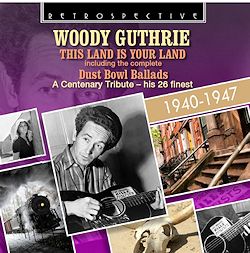1. This Land is Your Land [2:17]
2-13. Dust Bowl Ballads [40:25]
14. Babe o’ mine [2:43]; 15. I ride an old paint [2:32]; 16. Hard, ain’t it hard [2:32]; 17. Pretty boy Floyd [3:08]; 18. The Grand Coulee Dam [2:09]; New
York Town [2:35]; Gypsy Davey [2:49]; 21. Buffalo skinners [3:16]; 22. Pastures of plenty [2:27]; 23. Hard travellin’ [2:31]; 24. Ramblin’ round [2:13];
25. Talking Columbia blues [2:30]; 26. Hobo’s lullaby [2:24]
Woodie Guthrie (vocals and guitar) and The Almanac Singers (tracks 15,16), Cisco Houston (track 19)
rec. New York, USA at various times 1940-1947. Audio restoration and remastering by Martin Haskell
RETROSPECTIVE RTR4204 [76:38]
No history of American music, if it includes folk within its scope, could fail to include the music of Woodie Guthrie, described quite rightly in the liner
notes as the “dean of American folk music”. Indeed it’s hard to imagine how American folk music would sound if it hadn’t been for him. Though it is a fact
that he was influenced by the music he heard as a child he refined it and added a huge output into the mix that was itself taken forward and added to by
the likes of Pete and Peggy Seeger and others and was no doubt a considerable influence on people such as Bob Dylan and Joan Baez both of whom visited him
when he was in hospital shortly before he died. Woodie Guthrie’s story mirrors that of so many poor white farmers during the early years of the 20 th century whose lives were exacerbated by the dust storms in the mid-west and the wall street crash that as you read it you are instantly
reminded of Steinbeck’s Grapes of Wrath and especially as you listen to track 3 Talking Dust Bowl Blues you can picture that scene where
the entire family leave their home with everything they own piled into a rackety old truck. If Guthrie had been prepared to be moulded by record companies
to a greater extent then there’s no doubt he could have made a more successful career than he did but remaining true to his roots he ploughed his own
furrow, followed his conscience and sung his songs describing the plight of the poor everywhere, irrespective of race, all across the country and became
part of the protest movement that highlighted injustices and demanded change. Woodie Guthrie described a folksong in these words: “A folk song is what’s
wrong and how to fix it or could be, who’s hungry and where their mouth is or who’s out of work and where the job is or who’s broke and where the money is
or who’s carrying a gun and where the peace is”. His philosophy is summed up by this script he wrote for a radio show in 1944 “I hate a song that makes you
think you’re not any good. I hate a song that makes you think that you are just born to lose. Bound to lose. No good to anybody. No good for nothing.
Because you are either too old or too young or too fat or too slim or too this or too that....songs that run you down or poke fun at you on account of your
bad luck or your hard travelling. I am out to fight those kinds of songs to my very last breath of air and my last drop of blood”. Woodie Guthrie knew
plenty of hard times himself with a sister killed in a freak accident, his father losing everything in the 1920s, his mother ending up in an institution
and a daughter killed in a house fire. He died at the young age of 55 from Huntingdon’s Disease and left behind him over 3000 song lyrics, 2 novels,
articles, plays and poems. Though he wasn’t the greatest singer, just as Dylan isn’t Woodie Guthrie wrote songs that are a historical snapshot of America
and as such will live on well into the future and will be sung by anyone who cares about that history and about social justice. He left an incredibly
valuable legacy and in this centenary year this collection of 26 of his best songs is a good introduction to it that will have you wanting to explore more.
Steve Arloff
